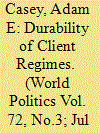|
|
|
Sort Order |
|
|
|
Items / Page
|
|
|
|
|
|
|
| Srl | Item |
| 1 |
ID:
173637


|
|
|
|
|
| Summary/Abstract |
Conventional wisdom holds that great power patrons prop up client dictatorships. But this is generally assumed rather than systematically analyzed. This article provides the first comprehensive analysis of the relationship between foreign sponsorship and authoritarian regime survival, using an original data set of all autocratic client regimes in the postwar period. The results demonstrate that patronage from Western powers—the United States, France, and the United Kingdom—is not associated with client regime survival. Rather, it’s only Soviet sponsorship that reduced the risk of regime collapse. The author explains this variation by considering the effects of foreign sponsorship on the likelihood of military coups d’état. He argues that the Soviet Union directly aided its clients by imposing a series of highly effective coup prevention strategies. By contrast, the US and its allies didn’t provide such aid, leaving regimes vulnerable to military overthrow.
|
|
|
|
|
|
|
|
|
|
|
|
|
|
|
|
| 2 |
ID:
174766


|
|
|
|
|
| Summary/Abstract |
This article explores the causes of authoritarian durability. Why do some authoritarian regimes survive for decades, often despite severe crises, while others collapse quickly, even absent significant challenges? Based on an analysis of all authoritarian regimes between 1900 and 2015, the authors argue that regimes founded in violent social revolution are especially durable. Revolutionary regimes, such as those in Russia, China, Cuba, and Vietnam, endured for more than half a century in the face of strong external pressure, poor economic performance, and large-scale policy failures. The authors develop and test a theory that accounts for such durability using a novel data set of revolutionary regimes since 1900. The authors contend that autocracies that emerge out of violent social revolution tend to confront extraordinary military threats, which lead to the development of cohesive ruling parties and powerful and loyal security apparatuses, as well as to the destruction of alternative power centers. These characteristics account for revolutionary regimes’ unusual longevity.
|
|
|
|
|
|
|
|
|
|
|
|
|
|
|
|
|
|
|
|
|